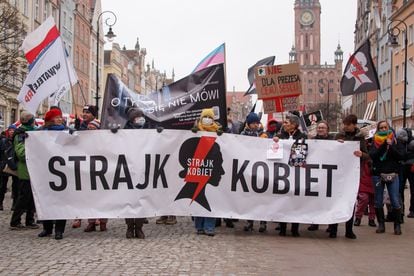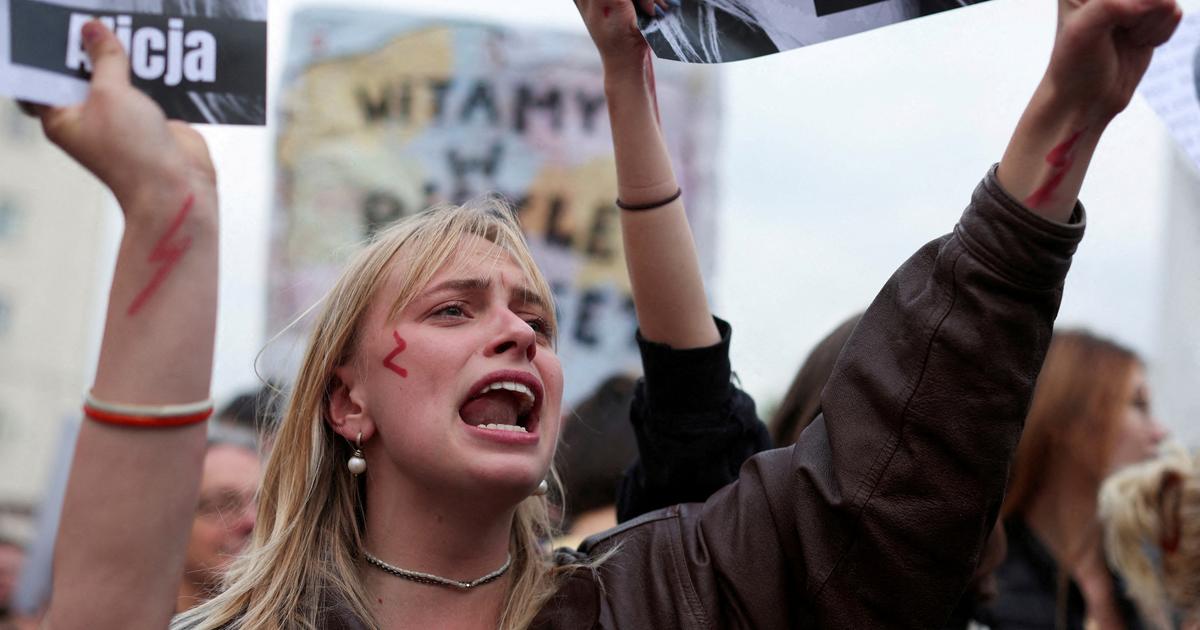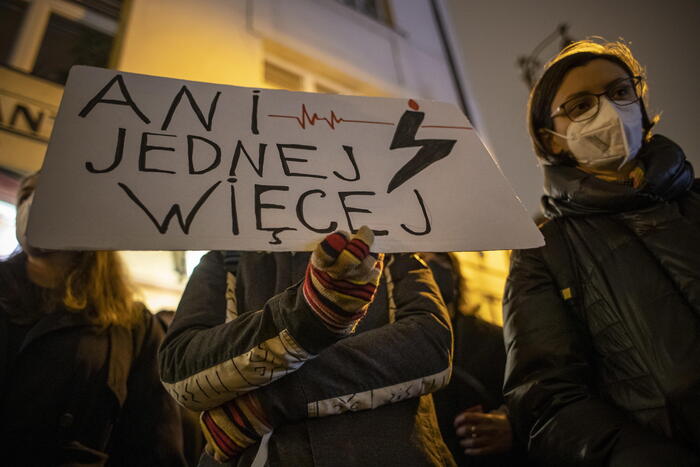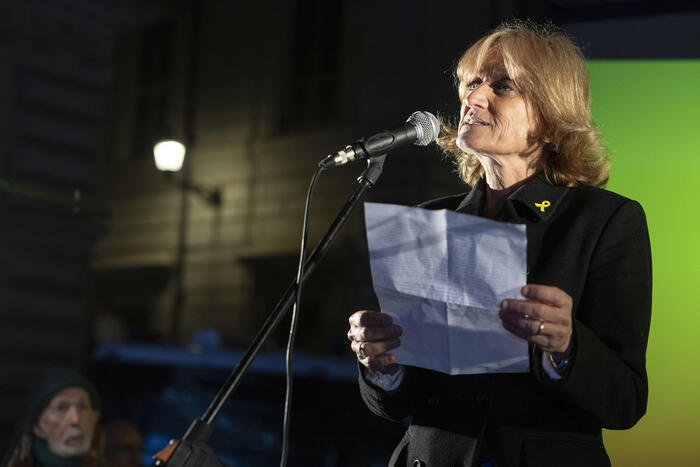When it seems that the right to abortion can no longer be restricted in Poland, the second toughest country in the EU after Malta, the news of the death of a woman because she did not have an abortion on time, a pregnancy registry and a project The law that entailed the total prohibition has stirred the spirits this autumn of a part of society among which discouragement and fear are beginning to spread. "There is sadness, terror and hopelessness," says Kamila Ferenc, a lawyer for the Federation of Women and Family Planning (Federa), who works to ensure the termination of pregnancy in cases where it is still legal, but are met with resistance. of doctors and hospitals.
Autumn began with a heavy blow. Izabela, a 30-year-old woman, became the first known victim of the latest abortion restrictions for feminist movements. The news came one year after the Constitutional Court ruling in October 2020 that eliminated the possibility of terminating a pregnancy in the event of a malformation of the fetus, which in practice accounted for 97% of abortions performed. The woman died of septic shock in September when doctors treating her waited for the unviable heart of the fetus to stop beating before performing a cesarean section. The case, which was unveiled in late October, again brought thousands of people onto the streets across the country in November under the slogan
Ani jednej więcej
(not one more).
Marta Lempart, founder of the Women's Strike movement, says that the historic protests of 2020 after the sentence - for which more than 4,000 people have gone through the courts, according to
Gazeta Wyborcza
- were aimed at ensuring that "no one died." They managed to publicize "the system outside the system" to achieve an abortion, through television, newspapers and on the streets. "We thought we were fine," he explains through a video call. But Izabela's death showed that "people do die."
The doctors who treated Izabela could have performed a legal abortion because her life was at risk, as the government of the ultra-conservative Law and Justice (PiS, in its acronym in Polish) was quick to clarify. Professor Krzysztof Krajewski, in his office at the Faculty of Law of the Jagiellonian University in Krakow, emphasizes that the case shows that “with the pressure and the atmosphere of the country, doctors are afraid of having problems, especially because the Prosecutor's Office is very politicized ”. In Poland, whoever helps a woman or performs an abortion considered illegal faces up to three years in prison, eight if it is considered that the life of the fetus was already viable outside the womb. Between 2002 and 2018 there were 410 convictions. “In statistical terms it is nothing, but it is the way of working of this Government:intimidation so that people give up their freedoms for fear of consequences. And this also applies to doctors ”, he adds.
After Izabela's death, there were marches and vigils throughout the country. Magdalena Grabowska, an expert sociologist in gender studies at the Polish Academy of Sciences, observed in those days a “feeling of loss, of failure”. "We knew that a person had died and nothing happened," he says. In her research with working groups with the Feminist Fund, she also perceives "a mixture of hope [for the mobilizations], but also, of disappointment and frustration."
They were still recovering from the duel when at the end of November a senator from Plataforma Cívica, the main opposition party, warned of the plans of the Ministry of Health to register pregnancies in medical records, along with other data such as blood type. The fuse of the controversy did not take long to ignite and the ministry issued a statement in which it assured that behind the order there were only medical reasons, such as providing emergency services. "For older people in this part of Europe, this brings back memories," says Krajewski, who recalls a similar record in communist Romania. "In other countries it would make sense, but here it was immediately understood that the goal was to control women," he adds.
“It is a dangerous idea because of the anti-abortion atmosphere. Doctors can see that a woman was pregnant and is no longer pregnant, and alert the police ”, explains Ferenc, who agrees that what the measure seeks is“ to control and intimidate women ”. Lempart sees the registry, which has yet to be approved by the Health Ministry before it goes into effect, as "the back door to ban abortion and contraceptives." "When it is proposed to prohibit abortion through a law, it is easier to mobilize society, but that is how they are administratively, undercover," he argues. "And it's more scary, because intimidation is individual," he adds. "People will distrust the state and will not go to the doctor," he warns, and also evokes "the communist era, when the state was the enemy."
After the setback of the registration proposal, a civic initiative promoted by anti-abortion groups that obtained the necessary signatures reached the Sejm, the Polish Parliament, which entailed the total prohibition of abortion - now it is allowed in case of rape or incest or when the the life or health of the mother is in danger - with penalties of between five and 25 years in prison for women and those who help them. The initiative was rejected on December 2 by a large majority, including most of the PiS group. The deputy of the ultraconservative party Anita Czerwinska considered the proposal "unacceptable" and "extreme" and stated that it could generate "social unrest". "It was clear that they were going to overthrow him because it was also problematic for the Government, but that an initiative like this reaches Parliament shows the atmosphere in this country",Krajewski notes.
Protests of the Women's Strike in Gdansk on November 28 against the registration of pregnancies and the proposal for a total ban on abortion.
Getty Images
On the same day, however, the lower house of the Sejm did admit an initiative to create an Institute of Family and Demography, which is now in a parliamentary committee.
The women's defense organizations and the LGTBI collective denounce that the proposal gives procedural powers to the president of the organization.
Lempart warns that it could intervene in divorce proceedings and in parental rights cases of "rainbow families."
He would also have access to all state databases, and he fears that these include pregnancies.
As the anti-abortion offensive rages, Polish society is opening up to liberalize it despite pressure from the Church and ultra-conservative groups, as Grabowska observes in his research.
73% opposed the 2020 Constitutional ruling in polls carried out shortly after.
In a survey for the digital medium Oko.press at the same time, up to 66% of those surveyed supported the right of women to terminate their pregnancy until week 12. However, no one expects the ultra-conservative Executive of PiS to pick up the social feeling.
"When there is a change of government, then hope will return," says Ferenc.
Until then, they will continue working to achieve, at least, "that women feel safe."
A network outside the system
Despite oppression and fear, as always, abortion continues. The Abortion Without Borders group has helped achieve 34,000 abortions since the October 2020 ruling. In the same period, Federa has answered 30,000 emails and calls, and has secured 300 interruptions of the pregnant woman, many based on the risk to the mother's mental health. .
There is a whole clandestine network that offers information with resources to abort abroad, obtain the pills to perform a medical abortion and even the morning after pill. T., a 26-year-old activist who asks to remain anonymous, remembers the first time he took action: “A stranger contacted me on Facebook. I gave him the morning-after pills at night, in an alley, with the hood up and aware of the danger. " In a cafeteria in Krakow, he explains that his group receives about 10 requests a week only for emergency contraception, which can be obtained with a prescription, but some doctors refuse to issue it, there are those who fear to request it and the time of intake is crucial. T. also offers psychological help to those who have aborted and support in their homes. It is not sanitary,but she is informed enough to know "when to worry and when not to worry."
She is aware of the risks she runs, and that she does not provide direct help.
“Sitting with someone and making food for them is not illegal, but buying them pills for a medical abortion is - that's why you never have to buy them for anyone.
Taking someone by car to Slovakia to have an abortion is not direct help, but it all depends on the prosecutor, ”he explains.
“I want no one to be afraid, that whoever needs it can access abortion and contraception.
Until we get there, I'll keep trying ”, he concludes.
Follow all the international information on
and
, or in
our weekly newsletter
.





/cloudfront-eu-central-1.images.arcpublishing.com/prisa/JKNMV5QC6BOTHMYCTVK4JK4J7I.jpg)



